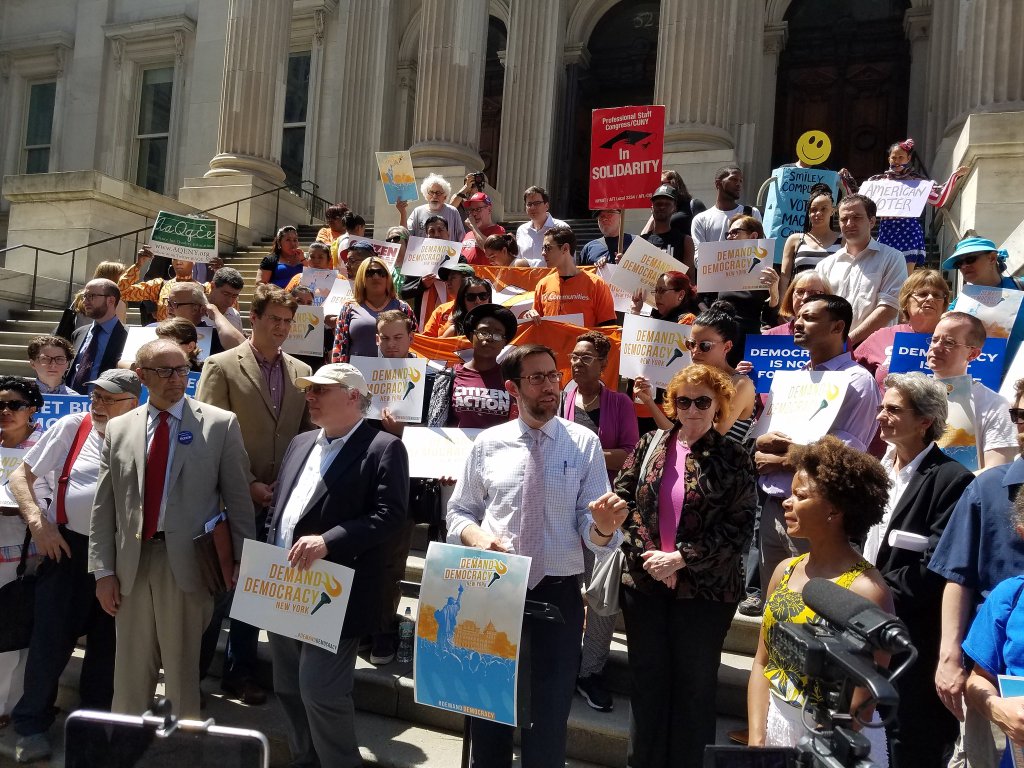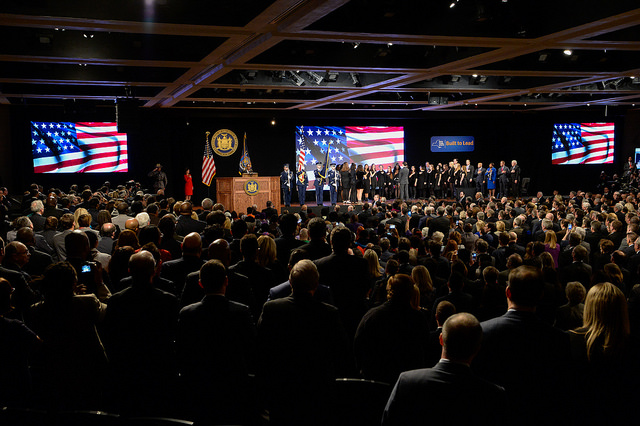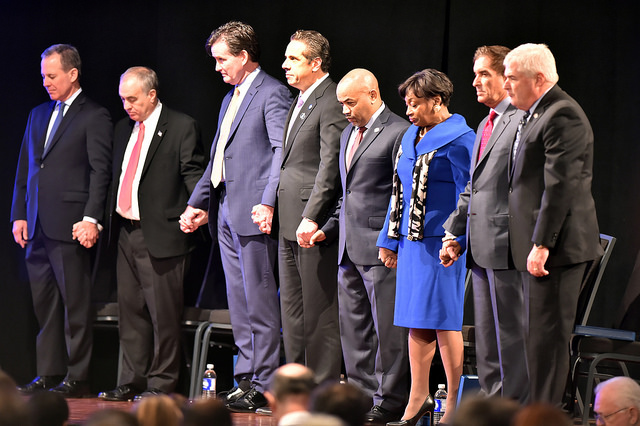New York Becomes 17th State to Call for Constitutional Overturn of Citizens United

Sen. Squadron and "Demand Democracy" ralliers (photo: @DanielSquadron)
Amid increasing calls for New York to pass bold government ethics reform and minimize the role of money in elections, a bipartisan majority of state lawmakers has taken a symbolic but somewhat significant step in calling for an amendment to the U.S. Constitution overturning the Supreme Court’s 2010 decision in the Citizens United case.
In Citizens United v. Federal Election Commission, the Supreme Court ruled that corporations and unions can be considered individuals as far as their political contributions are concerned and that restricting their ability to donate to candidates amounted to a violation of their First Amendment right of free speech. That decision opened the floodgates to unlimited amounts of money in elections, including through outside groups supportive of candidates that must not coordinate with official campaigns but can raise and spend unlimited sums. Nearly 80 percent of Americans agree that the decision needs to be overturned. As of Wednesday, so do 76 New York State Assembly members (of 150 seats) and 32 State Senators (of 63 seats), a bare majority in each house.
Lawmakers and advocates announced at a news conference at the Capitol Building in Albany on Wednesday that a majority of members had signed letters to Congress calling for an amendment. The declaration came barely a week after Governor Andrew Cuomo proposed legislation to blunt the effects of Citizens United. In his announcement, the governor called the decision of the Supreme Court’s worst and said, “This decision ignited the equivalent of a campaign nuclear arms race and created a shadow industry in New York — maligning the integrity of the electoral process and drowning out the voice of the people. Citizens United must be reversed.” This week, he said one of his six priorities for the remaining legislative session is moving forward with his legislation to combat Citizens United that further restricts coordination between candidates and supportive “independent” committees, known as Super PACs.
New York is the first state with a Republican-controlled chamber to call for an amendment, though only two Republicans supported it. (The last vote that gave the Senate effort a majority came from Democratic Sen. Todd Kaminsky, who was recently elected to the chamber, replacing Republican Dean Skelos, who was removed from office upon a felony corruption conviction.) New York now joins the ranks of 16 other states which have done so through resolutions and ballot initiatives. More than 700 municipalities across the country have also passed resolutions, including 21 in New York.
On Wednesday, Assemblymember James Brennan, who led the effort in his chamber, said in a statement, “When we think about the intent behind campaign finance laws, they are supposed to protect our democracy from corruption while preserving the integrity of our elections. Citizens United has done the opposite. By allowing corporations the same rights as individuals, campaigns across the country are being fueled by obscene amounts of money. This has to stop. I call on Congress to do the right thing and pass a constitutional amendment to right this wrong.”
In the Senate, there were four letters with largely the same language. Twenty-four Democrats signed one letter. The five-member Independent Democratic Conference signed the same letter, albeit separately. Democratic Conference Leader Andrea Stewart-Cousins signed one independently. The Republicans, Sen. Phil Boyle and Sen. Kemp Hannon, signed their own version with slightly different language.
“There is motion now in Republican-controlled legislatures to support an amendment,” said Jonah Minkoff-Zern, co-director of the Democracy Is For People campaign at Public Citizen, a nonprofit group that led a coalition of advocates calling on state lawmakers to support an amendment. “The state legislature also needs to follow through and pass state reform,” he added.
Lawmakers more than agree. “It’s great news that a bipartisan majority of State Senators and Assemblymembers support closing the corporate contribution floodgate Citizens United opened,” said Senator Daniel Squadron, in an emailed statement. Squadron led his colleagues in the Democrats’ letter. “It's critical that legislation also move forward to show New York’s strong support for the voice of everyday Americans in the political process.”
Squadron has been one of the leading proponents for closing New York’s infamous “LLC loophole,” which ostensibly allows wealthy individuals and corporations to give unlimited funds to political candidate campaigns through a variety of limited liability companies. Cuomo, a Democrat, has called for closing the loophole and Assembly Democrats have passed such a measure - but the Republican-controlled Senate has balked, defeating the efforts of Squadron and his allies. Good government groups have been calling for closure of the LLC loophole for years, along with a slew of other government ethics and campaign finance reforms in New York, most of which have gone nowhere.
Sen. Boyle, a Long Island Republican, echoed the call for reform in the final legislative package of the year, insisting that his Republican colleagues were equally concerned about the influence of big money on elections both at the state and national level. He said it was important that the same restrictions on campaign contributions apply to corporations, unions, and individuals, hitting one of the key sticking points for Republicans: that unions are treated similarly to corporations. Boyle recognizes that signing a letter to Congress is a symbolic move, but one that can have a strong impact. “I think it’s going to energize the debate and hopefully draw the attentions of our federal legislators,” he said in a phone interview. “As much pressure on Washington D.C. as we can exert, the better.”
Sen. Stewart-Cousins was also encouraged by two Republicans signing on to the petition and called for additional action on legislative reform. “Addressing the negative impact that the Citizens United decision has had on our democracy is important,” Stewart-Cousins said in a statement to Gotham Gazette, “but also we must take action to fix our own glaring campaign finance and ethics issues in New York State such as closing the LLC Loophole which also allows special interests to contribute endless amounts of money. The people of New York deserve an electoral system and government that they can trust.”
***
by Samar Khurshid, senior reporter, Gotham Gazette
@samarkhurshid @GothamGazette
Deals Emerge as Albany Legislative Session Moves Toward Conclusion

photo via The Governor's Office
After spending most of what was scheduled to be the last day of legislative session in stop-and-start negotiations, Gov. Andrew Cuomo and legislative leaders appeared on Thursday to reach a framework deal on several big-ticket items, though legislators will continue to negotiate, debate, and vote on Friday.
After a few issues had been decided on Wednesday, concept agreements emerged Thursday on the process of stripping corrupt lawmakers of their pensions; extending mayoral control of New York City schools for one year; and increasing disclosure requirements for independent political committees.
Democratic Assembly Speaker Carl Heastie cautioned the deal was only a “framework” around 8 p.m. and cautioned he didn’t know when an official announcement would be made.
Legislators are expected to return early Friday to continue voting on a host of legislation--most of which is fated to only pass one house. As Cuomo, Heastie, and Republican Senate Majority Leader John Flanagan work through deals on a variety of issues, the two majority leaders will continue to discuss them with their conferences, but things tend to move quickly as session ends, with new legislation given little time for review.
The Thursday evening deal is likely to be touted as a significant movement toward fixing Albany’s ethics crisis, though reform groups and many legislators feel independent expenditures hardly rank as a major issue compared to other problems with Albany’s campaign finance laws and feel that pension forfeiture is a superficial response to an ethics crisis that needs systematic reforms. While it is a welcome additional punishment for unethical behavior, many say, it does not create the type of preventative measures to limit pay-to-play culture and conflicts of interest.
The Senate and Assembly reached a deal on pension forfeiture last year--the Senate passed it but the Assembly balked after facing pressure from unions that were concerned their members were subject to the change along with legislators. The current deal would see the Senate pass the Assembly version that has a narrower scope of who would be subject to forfeiture upon a corruption conviction.
Meanwhile, legislators say an extension of mayoral control will be tied to other issues that have not become completely clear. None of Thursday's deals are final as no bills have been printed.
The deal is also said to include the release of $150,000 in supportive housing funds. Cuomo included $1.9 billion in funding for supportive and affordable housing in the budget but left the details to be decided by a memo of understanding with the two legislative leaders. It appears Senate Republicans have balked at releasing all of the funds until they get a renewal of the controversial 421-a tax credit.
Advocates used the day to express exasperation with the deal-making process that routinely leaves major issues until the last minute, and beyond, with both parties taking issues hostage.
Shelly Nortz, deputy executive director of policy at The Coalition for the Homeless, lashed out at Cuomo on Thursday for not prioritizing the signing of the MOU to detail how to spend the $1.9 billion in housing funds.
“This is far more than a failure to effectively address homelessness - it betrays the hypocrisy underlying Andrew Cuomo's perennial empty promises to the homeless,” wrote Nortz. “Gov. Cuomo, whose promises to the homeless have as much credence as a degree from Trump University, needs to show that he understands that promises mean nothing if you can’t keep your word. Absent the execution of the MOU to release the funds he himself included in the budget, Gov. Cuomo no longer has any claim to be a friend to the homeless or an expert on the issue.”
Many legislators who care about the issue express a sense of resignation. Sen. Mike Gianaris, Deputy Democratic Conference Leader, said he hoped the MOU funds will still be available next year, saying that when Democrats win control of the Senate chamber they will make sure funds are allocated. In theory, the MOU could be signed any time, but virtually no one thinks it will be signed before January if it is not signed by the end of session this week.
Gotham Gazette reported earlier this week that the housing funds were being linked to the controversial 421-a tax credit by Senate Republicans. There is speculation they are holding on to the MOU to negotiate a 421-a renewal next year.
On ethics and campaign finance reform - like closing the LLC loophole, limiting legislators’ outside income, and more - good government groups are exasperated and have resorted to telling voters to simply vote out incumbents who haven’t supported reform.
Meanwhile, there has been a good deal of negotiation to try for a compromise on legalizing and regulating daily fantasy sports. Legalizing widespread car-hailing apps like Uber and Lyft appears to have hit a wall, however.
There was some progress made in both houses on other issues on Thursday. The Senate passed a package of legislation designed to fight opioid and heroin addiction, while the Assembly is set to take up the legislation before the end of session.
Senators also appear set to vote on a bill that would extend the time period residents have to sue after being exposed to contamination. Republican Sen. Kathy Marchione, who sponsors the bill in the Senate and represents Hoosick Falls, where there has been a water contamination crisis, amended her bill yesterday, decoupling it from the Assembly’s bill and thereby assuring its failure. Marchione faced intense pushback from Hoosick Falls residents and environmentalist actor Mark Ruffalo, among others. Late last night Senate Republicans restored the bill to its original form and appeared set to vote on it late Thursday evening.
The Senate also unanimously passed a bill that will require the state to pay for indigent defense services in all counties of the state. Sen. John DeFrancisco, the Republican sponsor of the bill, was lauded by a number of Democrats who he is normally at odds with. The Assembly is expected to pass the bill before the end of session--when that end will come is unclear as negotiations continue to tumble forward.
***
by David King, Albany editor, Gotham Gazette
@DavidHowardKing @GothamGazette
Much Undecided, Last-Minute Frenzy Starts in Albany

Albany leaders (photo: Kevin P. Coughlin, Governor's Office)
The pace has picked up dramatically in Albany, where lawmakers had avoided any major legislative decisions since passing the budget in April. With three days left in session, dozens upon dozens of bills are being introduced, amended, and passed at a fever pace. And while a couple of deals among the governor and legislative leaders have been announced on somewhat high-profile matters, thornier issues still remain unsettled and many bills are likely to only pass one house before lawmakers leave the capital.
On Monday, with session scheduled to end on Thursday, Gov. Andrew Cuomo wrote the Legislature an open letter setting a list of his priorities - included on that list was reaching a deal on a package of legislation to combat heroin addiction; increasing breast cancer screening; passing government ethics reform; combating the Supreme Court’s Citizens United decision; improving safety at rail crossings; and updating the state’s alcohol control laws.
In his letter Cuomo framed the situation in Albany as particularly tough because of the national political environment, failing to mention the federal investigation into state economic development programming that has dogged that his administration and the fallout from various legislative scandals, including the conviction on federal corruption charges of two recent legislative leaders. Cuomo praised the Legislature for the work it already did, calling this year’s “one of the best budgets in modern history”
Cuomo wrote: “But with all we have done, we have more to do. As the old skeptic’s adage goes, “That’s great, but what have you done for me lately?” We can’t rest on our laurels – we have much more to accomplish this session. Right now, we have a chance to complete an ambitious agenda that will conclude one of the most effective and successful legislative sessions to date while improving the lives of millions of New Yorkers.”
Major issues absent from Cuomo’s to-do list include renewing mayoral control of New York City schools, which is set to expire June 30; agreeing on how to spend $2 billion in state funds to create and preserve supportive and low-income housing; the push to raise the age of adult criminal responsibility; and a number of other priorities he touted in his State of the State Address in January.
By late Tuesday, Cuomo’s office had announced deals with the Legislature on three of the six items he outlined in his letter: rail safety; heroin addiction; and amending the state’s liquor laws.
The Senate showed some interest in moving on Cuomo’s push on Citizens United and independent expenditures as Senate Majority Leader John Flanagan introduced a bill on the issue.
However, good government groups that gathered in Albany on Tuesday said they didn’t have much hope there would be any major action on government ethics reform this year. They largely scoffed at Cuomo’s targeting independent expenditures, saying that more money floods into New York’s elections through things like the LLC loophole and political party committees. Cuomo has backed changes to the LLC loophole and putting limits on how much cash party committees can take in, but he has done little this session to advance bills related to the issues.
“We’ve pleaded, we’ve talked rationally, we have pleaded with legislators and the governor’s office,” Barbara Bartoletti of The League of Women Voters told reporters. She said it is time for New Yorkers to vote out incumbents who don’t support ethics reform.
Meanwhile the houses of the Legislature have tried to come to deals on a bill that would allow for-hire vehicle services like Uber and Lyft to operate in New York State; a bill legalizing and regulating daily fantasy sports gambling; and one to allow online poker. All three may be stalling, though there is still time for negotiations.
The Republican-controlled Senate saw the introduction of two bills of particular interest to residents of New York City. One bill would extend mayoral control of New York City schools by three years, but would have enacted the education tax credit opposed by many Democrats. Senate Majority Leader John Flanagan had previously said he would only support a one-year extension of mayoral control while Cuomo and Democratic Assembly Speaker Carl Heastie have pressed for three.
Heastie rejected Flanagan’s proposal, telling reporters: “The Senate has the right to put in whatever bills they want to. I’ll be clear: Those proposals are a non-starter for us, so to me it was a waste of time to put those proposals in.”
A second straight one-year extension of mayoral control without anything else attached may be the best Mayor Bill de Blasio and his allies like Heastie can do.
The Senate also introduced a bill that would revive the controversial 421-a tax break for developers to build affordable housing, a program seen as key to the building of new affordable housing units in New York City. Heastie rejected the bill out of hand, union members have protested the bill did not have high enough wage standards. The program has been the subject of governmental and non-governmental negotiations for many months and there is no clear resolution at hand.
The fate of $2 billion set aside in the budget for supportive and affordable housing appears tied to the fate of 421-a, as Gotham Gazette reported on Monday. Assemblymember Andrew Hevesi told Susan Arbetter on The Capitol Pressroom, "The money for supportive housing has been thrown into negotiations that have little to do with it or are tangentially related.”
***
by David King, Albany editor, Gotham Gazette
@DavidHowardKing @GothamGazette




